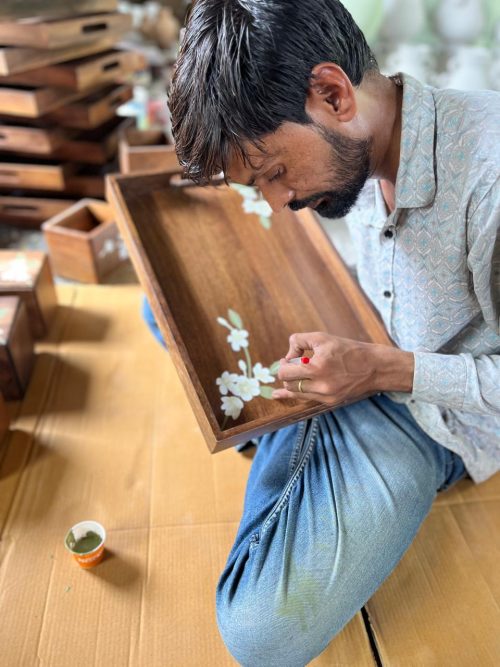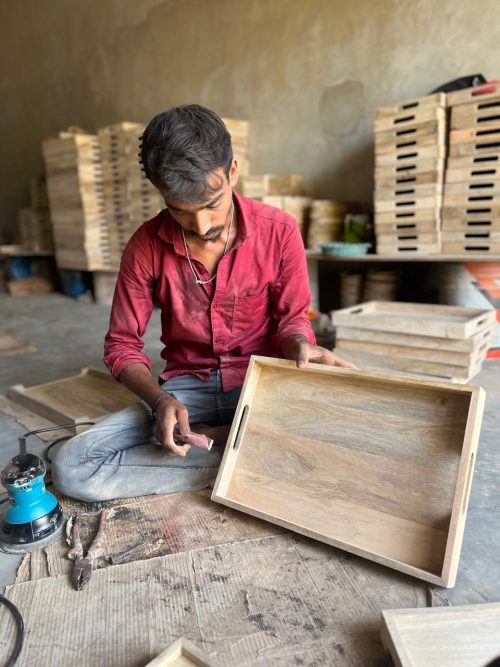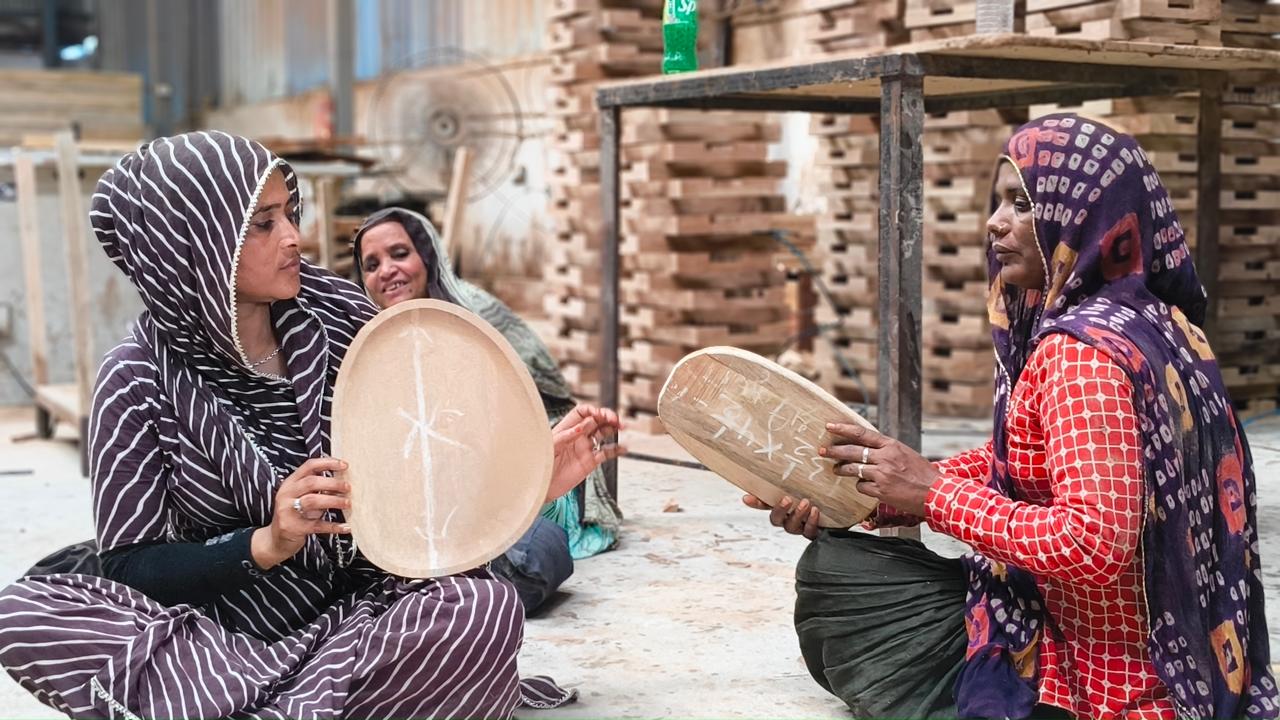Walking down the narrow lanes of Bagru, Rajasthan, you might see an artisan dip wooden blocks into rich dyes, pressing them against fabric with precision. Another glance, and you may catch wooden handicrafts, being shaped by hands that have mastered their craft for generations and then some.
Here, where skills and secrets have been passed down as inheritance, a couple from Jaipur has found a way to merge modern-day aesthetic sensibilities with the region’s age-old craft of woodwork and hand painting.
Punit Agarwal and his wife, Chandni Gupta, of Aurum Crafts, are making their mark with handcrafted kitchenware, proving that sustainable, and slow produced products can be a profitable venture for people, local communities, and founders alike.
A quest for creativity in the middle of monotony
Aurum began with a simple and universal desire: to create something that can be ascribed value. Not monetary value that fluctuates every Monday morning, but rather something intrinsic. “We both come from business families,” says Punit, the 39-year-old founder.
A computer engineer by training, his early career took him into his father’s metal fabrication business. Despite the success and stability of the family business, he found himself unfulfilled. “That work is obviously very monotonous,” he shares with The Better India. “It didn’t let me explore creative avenues, or do something that I could put my heart into.”

For Punit and Chandni, the idea for Aurum Crafts began to take shape during their personal realisation of Jaipur’s vast art and crafts scene. “Punit’s job could be quite mechanical and I have been in corporate for the past 12 years. Eventually, the time came where we wanted to do something that would focus on the creative aspects of our lives,”shares Chandni.
“Honestly we are big hosters; we love having people over, and I like to be creative and sustainable in the ways that I host. So, somewhere along the way, we got inspired by home decor, and utility items that had great aesthetic sensibilities. We thought why not take that up and turn it into something,” she says.
The name ‘Aurum,’ Latin for gold, conveys their vision for the brand. “I wanted the name to reflect what the brand meant to us,” Punit says. “It took me six months to find the right name because I wanted something that signified the value of this business and this craftsmanship,” he shares.
Tradition with modernity
Aurum Crafts makes handcrafted kitchenware that blends conventional design with modern aesthetics. Chandni, who takes care of the brand’s marketing and social media, elaborates on the brand’s approach: “With our brand it was clear that working with handcrafted (goods) would give us that peace of mind that we’re not further polluting the earth, and are keeping this craft industry alive by doing our small part,” she shares.

“But the thing with sustainability is that it often comes with a steep price, which is antithetical to the movement, but it is the truth. We realised that the market lacked affordable, high-quality kitchenware. We wanted to fill that gap, giving people high-quality, handcrafted items at a reasonable price,” she adds.
The couple sources all their wood locally from the renowned handicraft hubs of Jaipur and Jodhpur, ensuring the artisans who supply the raw materials and those who make and paint them are all paid fairly.
The product range, including wooden cheese platters, serving trays, cutting boards, and bowls, are semi-handcrafted and hand-painted, merging tradition with modernity. While the wood is processed, cut, and sanded by machines, the final assembly and fitting of each piece are done by hand. The finishing touches, including hand-polishing, are also done manually, ensuring that every piece is a unique work of art. This combination of machine-assisted and handmade craftsmanship results in precision and quality while retaining the authenticity and charm of traditional woodwork.
Challenges and triumphs
Despite coming from business backgrounds, both Punit and Chandni had little experience in product design, manufacturing, or working directly with artisans. “It took me a year to figure out everything,” says Punit. “From sourcing the wood to finding the right artisans, to building the design and the brand itself. While it only took five minutes for me to get inspired, it was a completely new avenue for me,” he says.
They also made the strategic decision to focus on an online, Direct-to-Consumer (D2C) model, avoiding the traditional retail route. “We were very particular about creating an online brand,” Punit explains. “I didn’t want to go into retail, because I believe the future is online businesses. People expect convenience, and that’s what D2C offers.”
But launching an online business brought its own set of challenges: “The whole ecosystem was complex and overwhelming at first,” Punit admits with a laugh. “I learnt everything through trial and error.”
Despite the early struggles, the first collection of Aurum Crafts was launched in 2022. The brand’s kitchenware — wooden cheese platters, serving trays, and cutting boards — were an instant hit. Yet, it wasn’t just the products that won over customers, it was the story behind the brand and the artisans who brought it to life.
The artists of Aurum
The couple has worked closely with several talented artisans from the Bagru region. “My first visit to the production house was to see exactly what happens on the ground to make these products, so I could translate it for our viewers as well,” Chandni shares.
“There I spoke to one of our women painters. She wasn’t a generational craftsperson, so our team had trained her,” she says. “She spoke to me about how it was only after the passing of her husband that she had to take on a job, and by luck she came across our brand and was able to learn something new and run her household independently,” she shares.

The woman in question is 32-year-old Achuki Prajapat. “Before, I didn’t work anywhere, I didn’t have to,” she says. “But I have three children, and it was hard to provide for them. Without a job, it was impossible and I also didn’t have a monetisable skill,” she shares. For Achuki, working with Aurum Crafts has been a turning point in her life. “They gave me training and I have been working with them from the start. I can support my children and contribute to the household. It’s a blessing.”
Sohan Vaishnav, a 32-year-old painter from Bagru, has been painting for 15 years. “I’ve always loved art and painting. It is an important outlet for me,” he shares. Sohan’s craft is more than just a livelihood, it’s a way to preserve the traditional techniques of his ancestors.
Continuing the legacy
As Aurum Crafts grows, with a monthly revenue of Rs 5 lakh per month, Punit and Chandni remain deeply committed to their values of sustainability, creativity, and social responsibility. “We want to continue building a brand that reflects our roots and speaks to people’s desire for meaningful, handcrafted products,” Punit says.
Looking ahead, they hope to expand their product line and reach even more customers across the globe. However, they remain focused on maintaining the integrity of their brand and continuing to support local artisans. And for artisans like Sohan and Achuki, working with Aurum has opened up a world of opportunities — proving that with the right platform and fair support, traditional crafts can thrive in the modern age.
Edited by Arunava Banerjee, All images courtesy Punit Agarwal
No comments:
Post a Comment